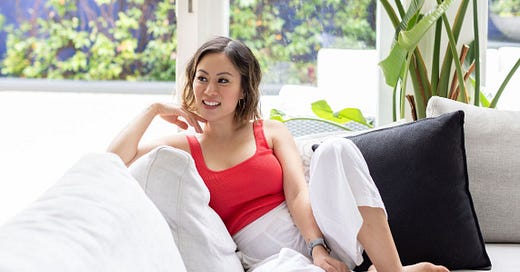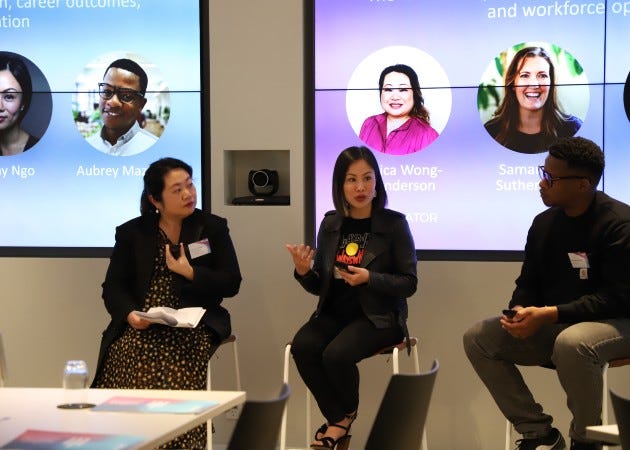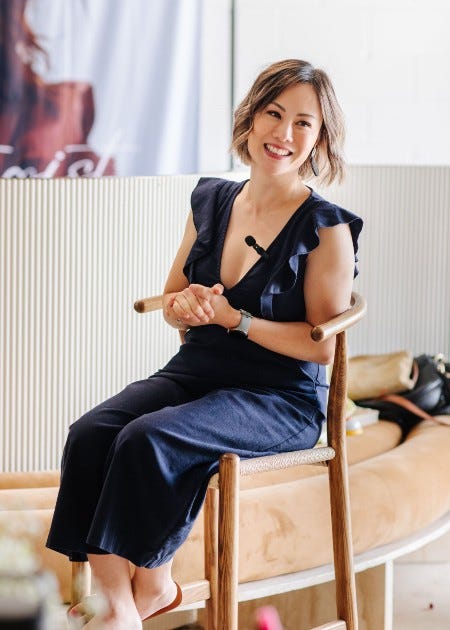Finding a voice and taking up space
Cathy Ngo used to make herself small, as a survival mechanism. Now she makes a living from speaking up and making space — for herself and for others who deserve it. Welcome to The Club.
“I felt so out of place ... Whenever I tried to speak to anyone I would get interrupted or talked over. Someone literally asked me: ‘Why are you here? What are your qualifications?’
“No one would ask me that if I was tall, or if I looked different; if I was of European or Anglo-Saxon background, or if I was a man.”
Content Warning: This story briefly discusses family and domestic violence.
Cathy Ngo was a creative, whimsical, curious kid, but her childhood was far from carefree.
Her parents were former refugees from Vietnam, and she experienced the everyday racism not uncommon in Sydney in the 90s. She felt pressure to succeed academically and personally — to be ‘good’, as a representative of her family and community.
She also grew up with family violence. Her father was abusive, physically and mentally, mainly towards her mother, but no one in the family was truly left unscathed.
That’s not what this story is about, exactly. But Cathy’s early life obviously shaped who she became as a young adult, navigating the professional world for the first time, not least contributing to struggles with depression and anxiety.
And those years then shaped her into the force she is today, influencing what she’s passionate about and what drives her.
Forging new paths
Cathy is founder and chief storyteller at Keynoteworthy, a platform making it easier for event organisers to find and book speakers from traditionally under-represented groups.
It’s designed to create more opportunities for talented speakers from diverse backgrounds, who may have been overlooked in the past. For event organisers, it makes it easier to create inclusive events, with more nuanced and compelling conversations on stage.
She’s an entrepreneur, a consultant, a writer, a podcaster and a frequent and celebrated keynote speaker herself.
Cathy is not afraid to speak up, to make her voice heard and to take up space. But she hasn’t always been that way.
“I was an anxious kid,” she says.
“I preferred to be on my own — I guess that was a way to keep myself safe; to get away from all the violence. But I made use of my boredom. I roamed around the streets, I climbed trees, I collected insects.”
While Cathy studied hard and loved to learn, she didn’t enjoy the rigidity of school, she explains.
“To this day, I’m a free spirit. I don’t like conformity so much.”
She still often finds herself down rabbit holes, deep-diving into the loss of species in her area (many of the bugs she used to collect are just not around anymore, she says), or into the lives of the people she meets.
“I am genuinely interested in people and their stories — what makes them tick, what they like to eat for breakfast, if they’re even a breakfast person, or if they’re a beach person or a forest bather — whatever it may be.”
Perhaps it’s no surprise then that Cathy’s early career took her into HR, communications and content. Soon, she found herself attending (and organising) conferences and events.
As a petite Asian woman, “I felt so out of place”, she says.
“I was really self-conscious. Whenever I tried to speak to anyone I would get interrupted or talked over. Someone literally asked me: ‘Why are you here? What are your qualifications?’
“No one would ask me that if I was tall, or if I looked different; if I was of European or Anglo-Saxon background, or if I was a man. At the time, it made me very angry.”
Cathy’s childhood survival mechanism was to make herself as small as possible, to disappear entirely if she could. But as an adult, and as a professional, that was no longer serving her.
She may have presented as quiet and compliant, but inside, Cathy was harbouring a healthy dose of rage. And, finally, she felt safe enough to act on it.
Breaking down barriers
Cathy launched Keynoteworthy in 2019, to get more of the stories we don’t hear out into the world, to normalise diversity at events, and to empower marginalised people to put their hands up for opportunities.
This is a systemic challenge, she says. There are more external barriers to women and people from diverse backgrounds. But there’s also extra cultural and emotional baggage that might be holding them back.
“There is this extra pressure,” Cathy says.
“If I’m on a panel, I’m thinking about whether people are going to speak over me or paraphrase what I’ve said and then take credit for it. I’m also thinking about who is moderating, and what their background is — it’s up to them to ensure everyone on the panel has an equal say.”
Women are more likely to be people pleasers, Cathy notes. It’s only in the last few decades our voices have been valued at all in a professional capacity — or that there have been footsteps to follow. For other under-represented and marginalised folk, the gap is even wider.
The pressure is not only to appear competent, confident and ‘like you belong’, it’s to show others what is possible for them. Mediocrity is simply not an option.
In the past, Cathy says she hasn’t always been ‘authentic’ in her own storytelling, for fear of coming across as “silly” or “incompetent”, or revealing too much vulnerability.
This is painfully relatable to me, and something I imagine will resonate with a lot of women.
It’s cultural too, she says. For some Asian communities there’s a strong emphasis on ‘saving face’; avoiding anything that might bring shame to yourself, your family or your community.
“There’s a lot of emphasis on what people might think,” she says.
“In my 20s, I was very self-conscious. I felt like I was walking on eggshells all the time. I think that’s why I enjoy going against the grain and just jumping in and doing things now — I’m confident in myself because I’m not in those confines anymore.”
Cathy didn’t get to this point overnight. In fact, she credits the shift largely to her therapist of many years.
“She taught me you can stay true to your cultural identity; that there are great things you can take from it, and things you can leave behind. I realised I had freedom of choice,” Cathy explains.
“I still had that guilt, I still felt pressure to be the good daughter, the good wife, the good mum, the good friend. But I realised I could set boundaries,” she adds.
“We all tell ourselves stories, in our heads. But we need to constantly challenge ourselves: Are they true? Where did you get these ideas from? Why are you so worried about it?”
Finding a way to common ground
Cathy’s entrepreneurial story started with a flicker of anger that arose into a flame of positive action. Now, just as she’s left behind her fear, her shame and her tendency to shrink herself, she’s left a lot of that anger behind too.
In the events space, in particular, she understands the systemic challenges and she understands that even the best intentions might not be realised in the final conference lineup.
The people doing the booking are not always the people making the final decisions — or signing the cheques.
There is, of course, work to be done. But to tackle a systemic challenge we need to examine the whole system.
“There is a lot of cancel culture, especially on social media, with people demanding to know why we’re still seeing all-male panels, for example,” Cathy notes.
“Instead of jumping the gun and shaming people, let’s peel back the layers. There’s a system here that is failing. Who is accountable for it?”
This philosophy extends into her personal ethos, too. Cathy still experiences microaggressions and outright racism, and she is still occasionally spoken over or dismissed.
But she doesn’t see those as ‘eyeroll moments’ anymore. Instead, she sees them as teaching opportunities.
“I try to use those moments to ask people about themselves and what they need. Some people may not know the right questions to ask, and some people just have no filter,” she says.
“There are a lot of things I am learning about, too. I also need to look myself in the mirror and check my privilege.”
Ultimately, Cathy believes most people are inherently ‘good’, even if they’re misinformed, biased or lacking knowledge. We are all just a product of our experiences and the systems we exist within.
She also believes everyone has a story. And that is exactly why sharing them is so important.
“Stories connect us,” she says.
“At our core, most people have similar values: We want a happy, healthy life and we want the next generation to live happy, healthy lives.”
Cathy finds strength not only in telling diverse stories, but in listening to them — really listening to them. She wants to understand the experiences and the challenges facing people from different backgrounds and different ages; different world-views, desires and perspectives.
She’s left a lot behind from her childhood, but one thing that still shines through is her insatiable curiosity. She’s still wide open to new learnings and new growth. She retains an air of whimsy.
“There is a lot of hurt and pain in this very divided world, but hearing each other’s stories and perspectives can give us hope. I think that’s key to closing the gap,” Cathy says.
“It’s important to listen, so that we all build this empathy,” she adds.
“It’s good for humanity.”
If Cathy’s story resonates, join the conversation…
If you’re comfortable sharing, we would love to hear your perspectives in the comments.
Know someone who needs to read this?
Hit that forward button and share this newsletter with your business besties.
Join the club
Subscribe for a fortnightly tell-all from the entrepreneurial and startup sphere. Because it feels so good to share, doesn’t it?







Wow, so much of this resonated with me, as a migrant PoC living in Melbourne. From similar experiences of being questioned and spoken to differently (something I rarely see in my local colleagues), and the baggage to be worked through. Cathy's an inspiration and this was such an encouraging read!